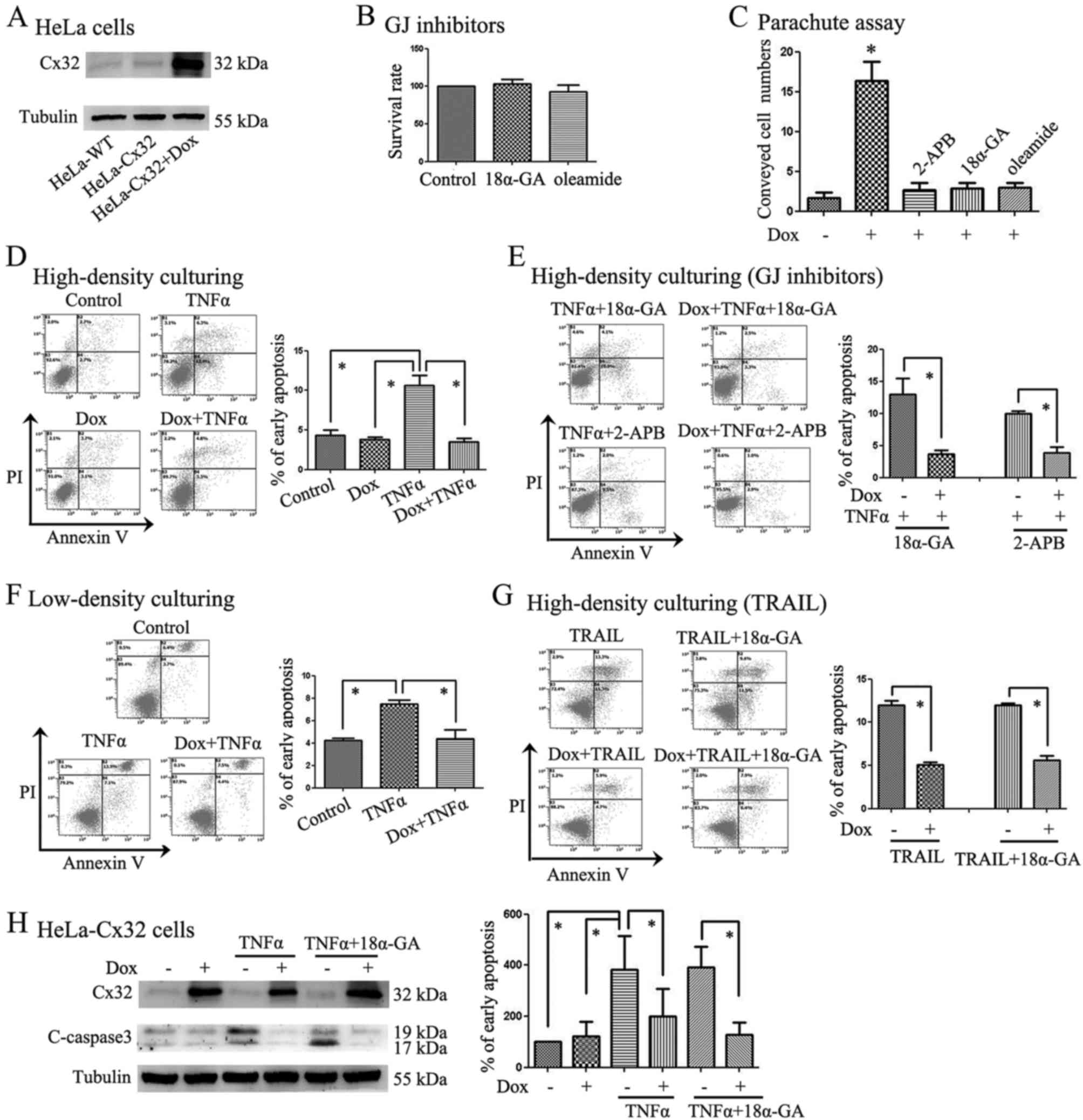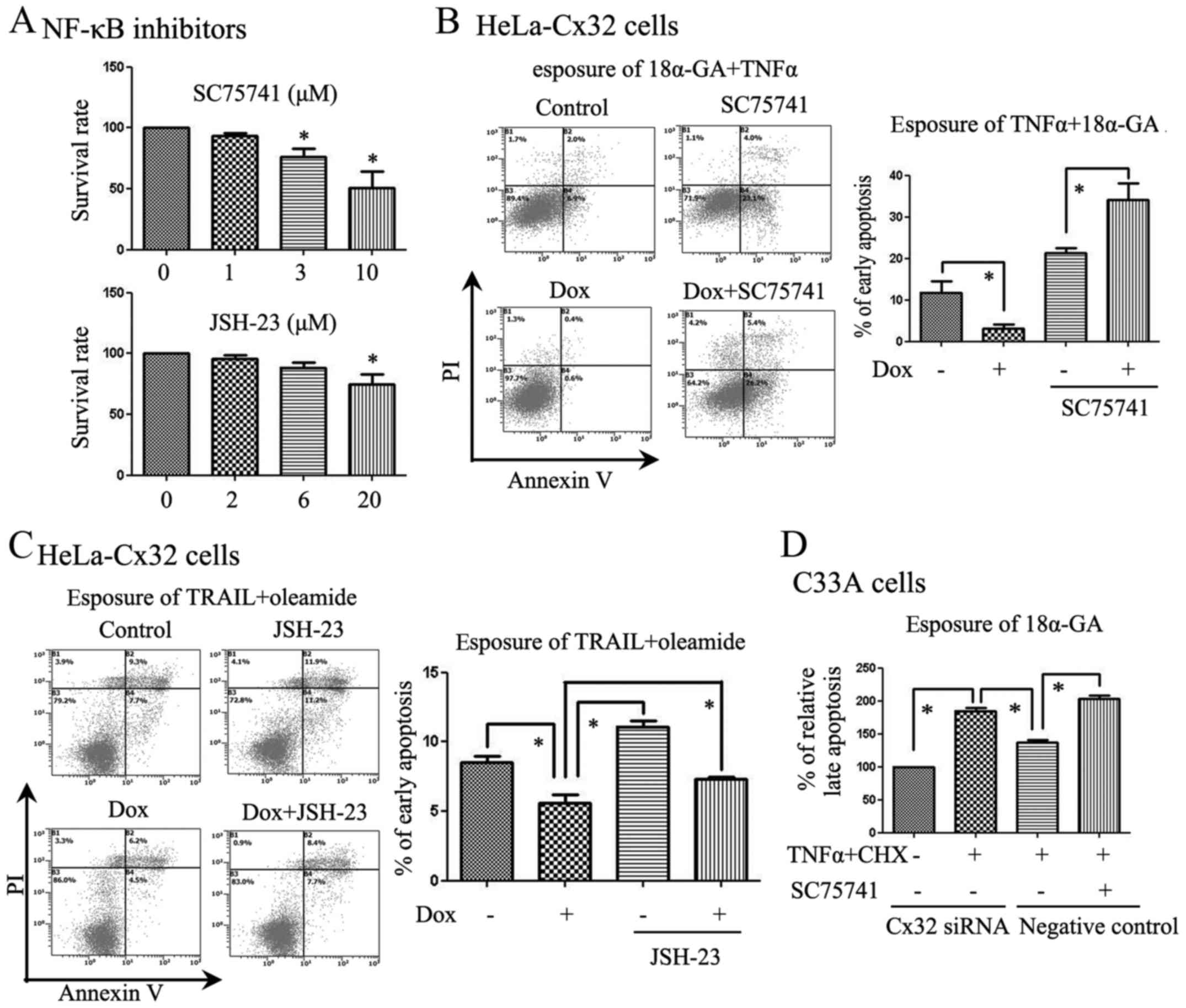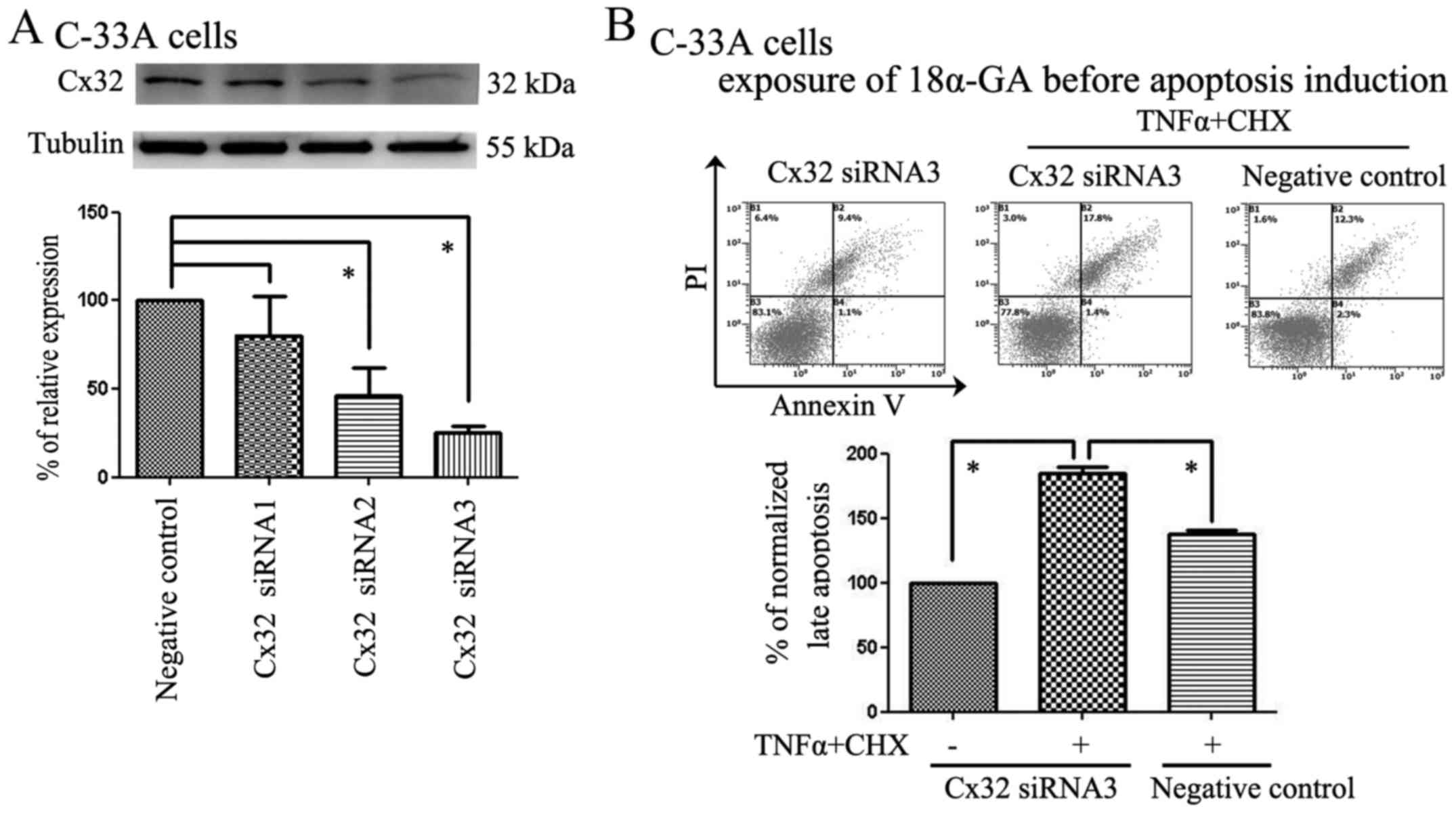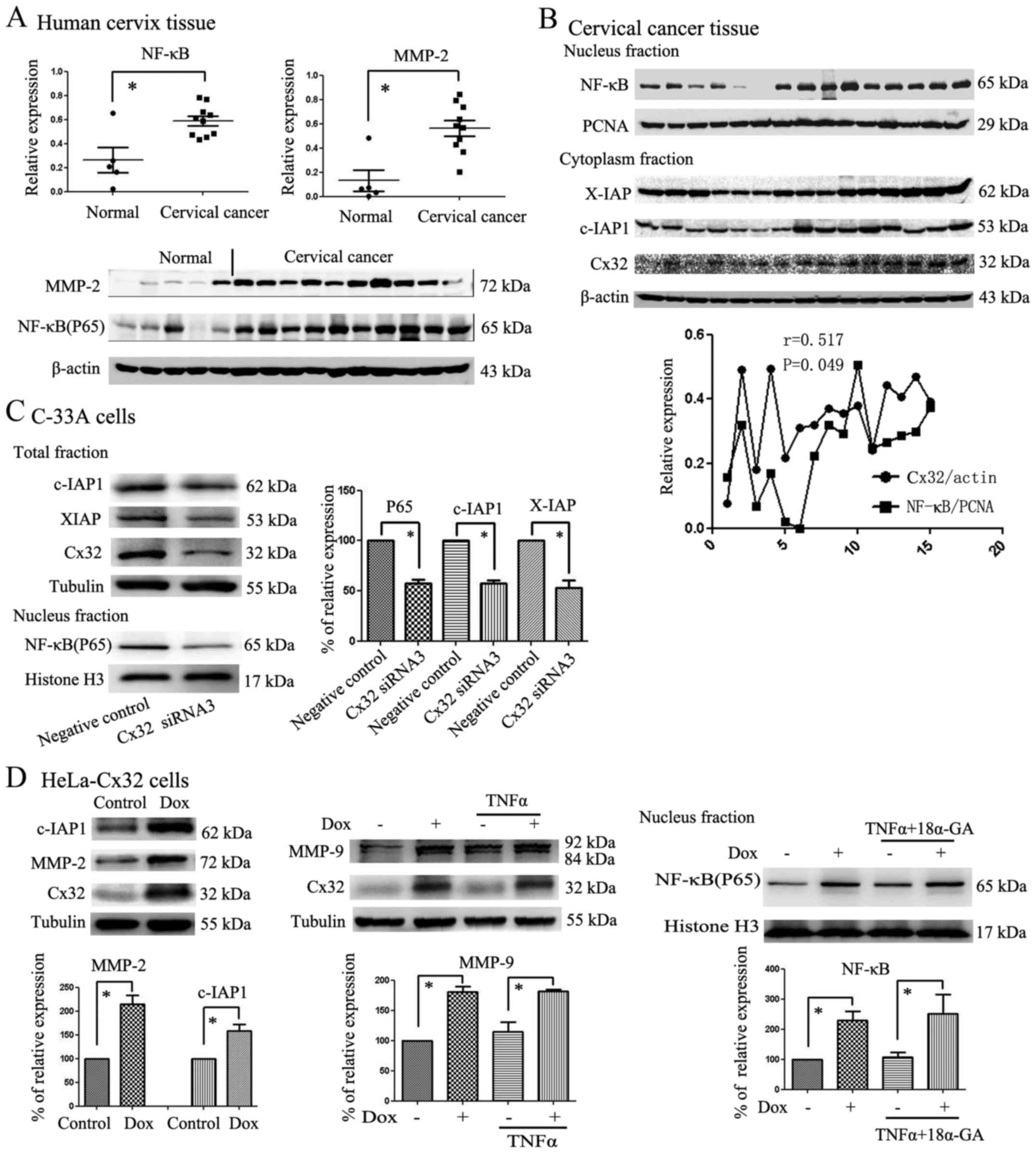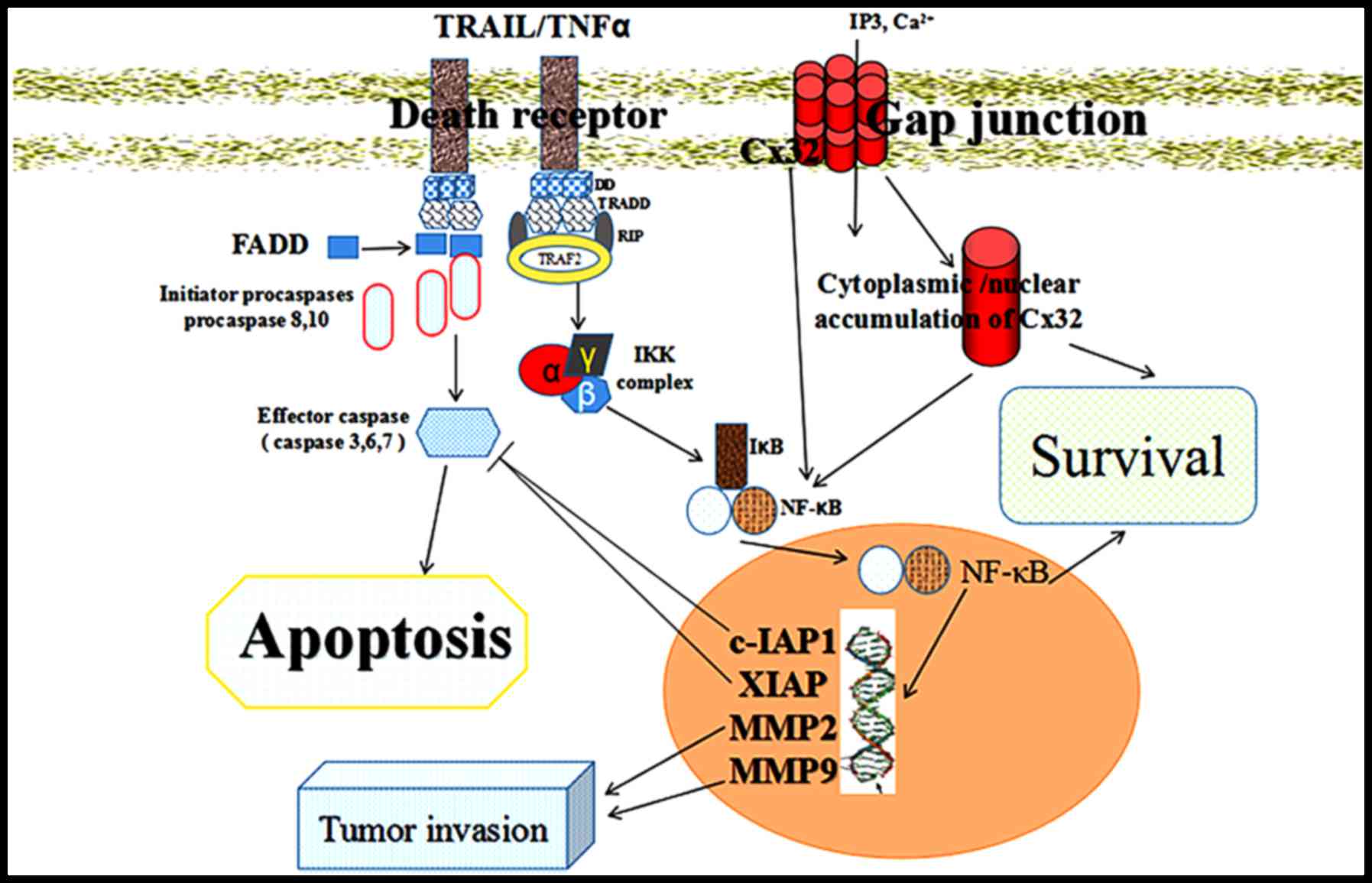|
1
|
Lagunas-Martínez A, Madrid-Marina V and
Gariglio P: Modulation of apoptosis by early human papillomavirus
proteins in cervical cancer. Biochim Biophys Acta. 1805:6–16.
2010.
|
|
2
|
de Freitas AC, Coimbra EC and Leitão Mda
C: Molecular targets of HPV oncoproteins: Potential biomarkers for
cervical carcinogenesis. Biochim Biophys Acta. 1845:91–103.
2014.PubMed/NCBI
|
|
3
|
Muench P, Probst S, Schuetz J, Leiprecht
N, Busch M, Wesselborg S, Stubenrauch F and Iftner T: Cutaneous
papilloma-virus E6 proteins must interact with p300 and block
p53-mediated apoptosis for cellular immortalization and
tumorigenesis. Cancer Res. 70:6913–6924. 2010. View Article : Google Scholar : PubMed/NCBI
|
|
4
|
Parrish AB, Freel CD and Kornbluth S:
Cellular mechanisms controlling caspase activation and function.
Cold Spring Harb Perspect Biol. 5:a86722013. View Article : Google Scholar
|
|
5
|
Han J, Soletti RC, Sadarangani A, Sridevi
P, Ramirez ME, Eckmann L, Borges HL and Wang JY: Nuclear expression
of β-catenin promotes RB stability and resistance to TNF-induced
apoptosis in colon cancer cells. Mol Cancer Res. 11:207–218. 2013.
View Article : Google Scholar : PubMed/NCBI
|
|
6
|
Carette D, Gilleron J, Chevallier D,
Segretain D and Pointis G: Connexin a check-point component of cell
apoptosis in normal and physiopathological conditions. Biochimie.
101:1–9. 2014. View Article : Google Scholar
|
|
7
|
Kameritsch P, Khandoga N, Pohl U and
Pogoda K: Gap junctional communication promotes apoptosis in a
connexin-type-dependent manner. Cell Death Dis. 4:e5842013.
View Article : Google Scholar : PubMed/NCBI
|
|
8
|
Mao XY, Li QQ, Gao YF, Zhou HH, Liu ZQ and
Jin WL: Gap junction as an intercellular glue: Emerging roles in
cancer EMT and metastasis. Cancer Lett. 381:133–137. 2016.
View Article : Google Scholar : PubMed/NCBI
|
|
9
|
Zhao B, Zhao W, Wang Y, Xu Y, Xu J, Tang
K, Zhang S, Yin Z, Wu Q and Wang X: Connexin32 regulates hepatoma
cell metastasis and proliferation via the p53 and Akt pathways.
Oncotarget. 6:10116–10133. 2015. View Article : Google Scholar :
|
|
10
|
Chen ZY, Wang R, Huang F, Yuan DD and Li
SR: Inhibition of gap junctions relieves the hepatotoxicity of
TNF-α. Genet Mol Res. 14:11896–11904. 2015. View Article : Google Scholar : PubMed/NCBI
|
|
11
|
Zhao Y, de Toledo SM, Hu G, Hei TK and
Azzam EI: Connexins and cyclooxygenase-2 crosstalk in the
expression of radiation-induced bystander effects. Br J Cancer.
111:125–131. 2014. View Article : Google Scholar : PubMed/NCBI
|
|
12
|
Autsavapromporn N, De Toledo SM, Jay-Gerin
JP, Harris AL and Azzam EI: Human cell responses to ionizing
radiation are differentially affected by the expressed connexins. J
Radiat Res (Tokyo). 54:251–259. 2013. View Article : Google Scholar
|
|
13
|
Murphy SF, Varghese RT, Lamouille S, Guo
S, Pridham KJ, Kanabur P, Osimani AM, Sharma S, Jourdan J, Rodgers
CM, et al: Connexin 43 inhibition sensitizes chemoresistant
glioblastoma cells to temozolomide. Cancer Res. 76:139–149. 2016.
View Article : Google Scholar :
|
|
14
|
Kim YJ, Kim J, Kim YS, Shin B, Choo OS,
Lee JJ and Choung YH: Connexin 43 acts as a proapoptotic modulator
in cisplatin-induced auditory cell death. Antioxid Redox Signal.
25:623–636. 2016. View Article : Google Scholar : PubMed/NCBI
|
|
15
|
Cao YW, Lu TC, Pan XL, Li F, Zhong HH, Sun
Y, Jiang JF and Li L: Correlation of expression of connexin to
growth and progression of cervical carcinoma in situ. Chin J
Cancer. 24:567–572. 2005.In Chinese.
|
|
16
|
Aasen T, Graham SV, Edward M and Hodgins
MB: Reduced expression of multiple gap junction proteins is a
feature of cervical dysplasia. Mol Cancer. 4:312005. View Article : Google Scholar : PubMed/NCBI
|
|
17
|
Zhao Y, Lai Y, Ge H, Guo Y, Feng X, Song
J, Wang Q, Fan L, Peng Y, Cao M, et al: Non-junctional Cx32
mediates anti-apoptotic and pro-tumor effects via epidermal growth
factor receptor in human cervical cancer cells. Cell Death Dis.
8:e27732017. View Article : Google Scholar : PubMed/NCBI
|
|
18
|
Ehrhardt C, Rückle A, Hrincius ER,
Haasbach E, Anhlan D, Ahmann K, Banning C, Reiling SJ, Kühn J,
Strobl S, et al: The NF-κB inhibitor SC75741 efficiently blocks
influenza virus propagation and confers a high barrier for
development of viral resistance. Cell Microbiol. 15:1198–1211.
2013. View Article : Google Scholar : PubMed/NCBI
|
|
19
|
Wu D, Fan L, Xu C, Liu Z, Zhang Y, Liu L,
Wang Q and Tao L: GJIC Enhances the phototoxicity of
photofrin-mediated photodynamic treatment by the mechanisms related
with ROS and Calcium pathways. J Biophotonics. 8:764–774. 2015.
View Article : Google Scholar : PubMed/NCBI
|
|
20
|
Goldberg GS, Bechberger JF and Naus CC: A
pre-loading method of evaluating gap junctional communication by
fluorescent dye transfer. Biotechniques. 18:490–497.
1995.PubMed/NCBI
|
|
21
|
Zhu M, Du J, Liu AD, Holmberg L, Chen SY,
Bu D, Tang C and Jin H: L-cystathionine inhibits oxidized low
density lipoprotein-induced THP-1-derived macrophage inflammatory
cytokine monocyte chemoattractant protein-1 generation via the
NF-κB pathway. Sci Rep. 5:104532015. View Article : Google Scholar
|
|
22
|
Juszczak GR and Swiergiel AH: Properties
of gap junction blockers and their behavioural, cognitive and
electrophysiological effects: Animal and human studies. Prog
Neuropsychopharmacol Biol Psychiatry. 33:181–198. 2009. View Article : Google Scholar : PubMed/NCBI
|
|
23
|
Yang Y, Qin SK, Wu Q, Wang ZS, Zheng RS,
Tong XH, Liu H, Tao L and He XD: Connexin-dependent gap junction
enhancement is involved in the synergistic effect of sorafenib and
all-trans retinoic acid on HCC growth inhibition. Oncol Rep.
31:540–550. 2014. View Article : Google Scholar :
|
|
24
|
He B, Tong X, Wang L, Wang Q, Ye H, Liu B,
Hong X, Tao L and Harris AL: Tramadol and flurbiprofen depress the
cytotoxicity of cisplatin via their effects on gap junctions. Clin
Cancer Res. 15:5803–5810. 2009. View Article : Google Scholar : PubMed/NCBI
|
|
25
|
Qi Z, Shen L, Zhou H, Jiang Y, Lan L, Luo
L and Yin Z: Phosphorylation of heat shock protein 27 antagonizes
TNF-α induced HeLa cell apoptosis via regulating TAK1
ubiquitination and activation of p38 and ERK signaling. Cell
Signal. 26:1616–1625. 2014. View Article : Google Scholar : PubMed/NCBI
|
|
26
|
Dai X, Zhang J, Arfuso F, Chinnathambi A,
Zayed ME, Alharbi SA, Kumar AP, Ahn KS and Sethi G: Targeting
TNF-related apoptosis-inducing ligand (TRAIL) receptor by natural
products as a potential therapeutic approach for cancer therapy.
Exp Biol Med (Maywood). 240:760–773. 2015. View Article : Google Scholar
|
|
27
|
Zhang B, Gui L, Zhu L, Zhao X, Yang Y and
Li Q: Forkhead box protein O1 mediates apoptosis in a cancer
cervical cell line treated with the antitumor agent tumor necrosis
factor-α. Genet Mol Res. 14:7446–7454. 2015. View Article : Google Scholar : PubMed/NCBI
|
|
28
|
Wang L, Du F and Wang X: TNF-alpha induces
two distinct caspase-8 activation pathways. Cell. 133:693–703.
2008. View Article : Google Scholar : PubMed/NCBI
|
|
29
|
Oikonomou E and Pintzas A: The TRAIL of
oncogenes to apoptosis. Biofactors. 39:343–354. 2013. View Article : Google Scholar : PubMed/NCBI
|
|
30
|
Sadarangani A, Kato S, Espinoza N, Lange
S, Llados C, Espinosa M, Villalón M, Lipkowitz S, Cuello M and Owen
GI: TRAIL mediates apoptosis in cancerous but not normal primary
cultured cells of the human reproductive tract. Apoptosis.
12:73–85. 2007. View Article : Google Scholar
|
|
31
|
Bauvois B: New facets of matrix
metalloproteinases MMP-2 and MMP-9 as cell surface transducers:
Outside-in signaling and relationship to tumor progression. Biochim
Biophys Acta. 1825:29–36. 2012.
|
|
32
|
Soonthornthum T, Arias-Pulido H, Joste N,
Lomo L, Muller C, Rutledge T and Verschraegen C: Epidermal growth
factor receptor as a biomarker for cervical cancer. Ann Oncol.
22:2166–2178. 2011. View Article : Google Scholar : PubMed/NCBI
|
|
33
|
Kakiashvili E, Dan Q, Vandermeer M, Zhang
Y, Waheed F, Pham M and Szászi K: The epidermal growth factor
receptor mediates tumor necrosis factor-alpha-induced activation of
the ERK/GEF-H1/RhoA pathway in tubular epithelium. J Biol Chem.
286:9268–9279. 2011. View Article : Google Scholar : PubMed/NCBI
|
|
34
|
De S, Dermawan JK and Stark GR: EGF
receptor uses SOS1 to drive constitutive activation of NFκB in
cancer cells. Proc Natl Acad Sci USA. 111:11721–11726. 2014.
View Article : Google Scholar
|
|
35
|
Flusberg DA and Sorger PK: Surviving
apoptosis: Life-death signaling in single cells. Trends Cell Biol.
25:446–458. 2015. View Article : Google Scholar : PubMed/NCBI
|
|
36
|
Yi XP, Han T, Li YX, Long XY and Li WZ:
Simultaneous silencing of XIAP and survivin causes partial
mesenchymal-epithelial transition of human pancreatic cancer cells
via the PTEN/PI3K/Akt pathway. Mol Med Rep. 12:601–608. 2015.
View Article : Google Scholar : PubMed/NCBI
|
|
37
|
Varfolomeev E and Vucic D: (Un)expected
roles of c-IAPs in apoptotic and NFkappaB signaling pathways. Cell
Cycle. 7:1511–1521. 2008. View Article : Google Scholar : PubMed/NCBI
|
|
38
|
Sethi G, Shanmugam MK, Ramachandran L,
Kumar AP and Tergaonkar V: Multifaceted link between cancer and
inflammation. Biosci Rep. 32:1–15. 2012. View Article : Google Scholar
|
|
39
|
Xie X, Lan T, Chang X, Huang K, Huang J,
Wang S, Chen CX, Liu P and Huang H: Connexin43 mediates NF-κB
signalling activation induced by high glucose in GMCs: Involvement
of c-Src. Cell Commun Signal. 11:382013. View Article : Google Scholar
|
|
40
|
Filippova M, Song H, Connolly JL, Dermody
TS and Duerksen-Hughes PJ: The human papillomavirus 16 E6 protein
binds to tumor necrosis factor (TNF) R1 and protects cells from
TNF-induced apoptosis. J Biol Chem. 277:21730–21739. 2002.
View Article : Google Scholar : PubMed/NCBI
|
|
41
|
Prabhavathy D, Prabhakar BN and
Karunagaran D: HPV16 E2-mediated potentiation of NF-κB activation
induced by TNF-α involves parallel activation of STAT3 with a
reduction in E2-induced apoptosis. Mol Cell Biochem. 394:77–90.
2014. View Article : Google Scholar : PubMed/NCBI
|
|
42
|
Shostak K, Zhang X, Hubert P, Göktuna SI,
Jiang Z, Klevernic I, Hildebrand J, Roncarati P, Hennuy B, Ladang
A, et al: NF-κB-induced KIAA1199 promotes survival through EGFR
signalling. Nat Commun. 5:52322014. View Article : Google Scholar
|
|
43
|
Yano T and Yamasaki H: Regulation of
cellular invasion and matrix metalloproteinase activity in HepG2
cell by connexin 26 transfection. Mol Carcinog. 31:101–109. 2001.
View Article : Google Scholar : PubMed/NCBI
|
|
44
|
Lamiche C, Clarhaut J, Strale PO, Crespin
S, Pedretti N, Bernard FX, Naus CC, Chen VC, Foster LJ, Defamie N,
et al: The gap junction protein Cx43 is involved in the
bone-targeted metastatic behaviour of human prostate cancer cells.
Clin Exp Metastasis. 29:111–122. 2012. View Article : Google Scholar
|
|
45
|
Kessenbrock K, Plaks V and Werb Z: Matrix
metalloproteinases: Regulators of the tumor microenvironment. Cell.
141:52–67. 2010. View Article : Google Scholar : PubMed/NCBI
|
|
46
|
Kardami E, Dang X, Iacobas DA, Nickel BE,
Jeyaraman M, Srisakuldee W, Makazan J, Tanguy S and Spray DC: The
role of connexins in controlling cell growth and gene expression.
Prog Biophys Mol Biol. 94:245–264. 2007. View Article : Google Scholar : PubMed/NCBI
|
|
47
|
Decrock E, Vinken M, De Vuyst E, Krysko
DV, D'Herde K, Vanhaecke T, Vandenabeele P, Rogiers V and Leybaert
L: Connexin-related signaling in cell death: To live or let die?
Cell Death Differ. 16:524–536. 2009. View Article : Google Scholar : PubMed/NCBI
|















